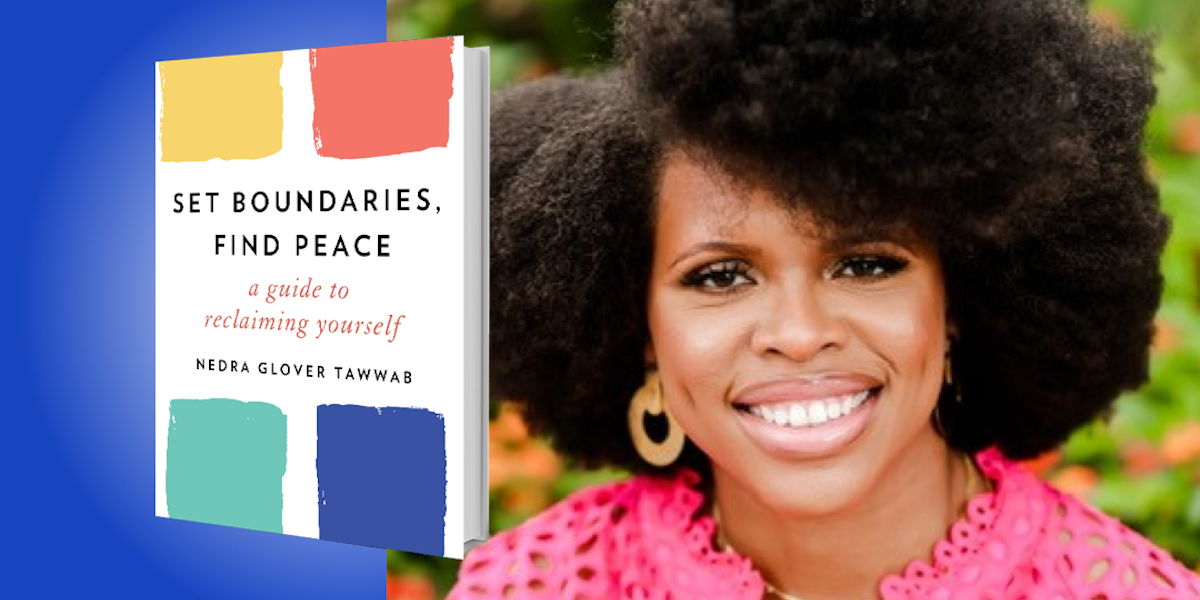Nedra Glover Tawwab has been a licensed therapist for 14 years, with a specialized focus on healthy relationships. She is the founder of a group therapy practice called Kaleidoscope Counseling. Over the years she observed the importance of effective, appropriate boundaries in cultivating our connections and maintaining inner peace.
Below, Nedra shares 5 key insights from her new book, Set Boundaries, Find Peace: A Guide to Reclaiming Yourself (available now from Amazon). Listen to the audio version—read by Nedra herself—in the Next Big Idea App.
1. You already have the words.
We often struggle to find the right words to set boundaries. I’m a content creator and, on Instagram, people in my community will ask me questions like, “I want to set a boundary with my friend about how much she dumps on me when I’m getting off of work. How do I state that?” Very often, we already know what to say, but we’re concerned that it’s going to be perceived as mean, or if the other person will get upset with us. We worry what will happen after we set the boundary.
A really clear way to set the boundary is to let them know what you like instead of what the problem is. For example, if you have someone who is emotionally dumping, it might be helpful to say to your friend, “Hey, after work is not the best time to talk to me about heavy stuff, because I’m debriefing in my head as well. Could you please maybe wait until after we have some chitchat to bring in the really heavy topics?” Or people will ask me something like, “I don’t want my mom showing up unannounced. How do I let her know that I don’t like that?” Again, you already have the words; just say, “I don’t want you showing up unannounced. Please let me know before you arrive or plan to come.” In our attempts to please others and be kind to people, we forget that we already have the words we’re seeking.
“From a very young age, we’re told that our boundaries are not nice or kind, and we internalize that message.”
2. Reclaim your boundaries.
Somewhere along the way, we have learned that it’s not nice to have boundaries—but we forget that many of us have had boundaries for years. Usually, right around the age of two you start developing this sense of saying “no.” Any two-year-old can say no, very clearly. What happens, however, is that the adults stop them from doing this. Young children start to get the message that it’s not okay to say no, that it’s not nice to push people away. Sometimes we don’t want hugs, sometimes we don’t like certain foods, and we know which things we feel comfortable doing and which things we don’t. And so, from a very young age, we’re told that our boundaries are not nice or kind, and we internalize that message. Then, as adults, we become people who have issues setting boundaries.
It’s time to reclaim your voice. That doesn’t mean going back to being a two-year-old who says no to everything—it means really thinking about the things that you like to do and the things you don’t like to do. Sometimes it’s not even about your desire to do things; it could be about your ability. Maybe your schedule is already full, and still you’re saying yes. But you know what you need—reclaim your voice, and use it.
3. Focus on the solution, not the problem.
With boundaries, we often get it wrong because we’re focused on what the problem is. We’ll give two paragraphs about what we want someone to reflect on, how they made us feel, what the offense was, but nowhere in those two paragraphs will we say, “This is what I need; this is what I would like to happen; this is my desire for the future.” That piece is so important for people to hear and understand when you’re setting boundaries. You must tell them what you need, not just the problem.
So don’t say to someone, “Here is my problem, please come up with a solution,” and expect your desired boundary. People cannot guess what the boundary is by you talking about a problem. Be very clear about what you would like to see as a solution: “When you come over, please call before you come.” Or, “I’m having a party on Saturday, please arrive at five.” Be super clear about what the boundary is, because often people don’t know. They’re adhering to their boundaries, they are focused on their world, and they may unintentionally violate a boundary because you are not being clear about what it is.
“Be very clear what the consequence will be if a boundary is violated, and follow through.”
4. You have to uphold your boundary.
This is a really hard part of boundary-setting because we often think that once we tell someone our boundary, it is up to them to honor it. But in most cases, we have to do some work on our end. If someone has been told a boundary, what will you do if they violate it? What will the consequence be? How will you hold them accountable? This is the piece that many of us are missing in really honoring our boundaries. We have to stick to them—we can’t tell people we want something, and then when they violate the boundary, allow them to have their way with us. So it’s important that you continue to honor the boundary, even when someone else isn’t. Be very clear what the consequence will be if a boundary is violated, and follow through. Don’t make the consequence something that you really can’t do; make sure it’s something that is within your power to control.
5. You can have boundaries in any type of relationship.
Often I am asked, “Well, what about my relationship with my mom? She won’t listen to my boundaries.” Or, “What about my relationship with my grandmother?” People listen to boundaries—even your grandmother. Your grandmother is respecting someone’s boundaries. Even your mother is respecting someone’s boundaries.
To get complicated people in your life to respect boundaries, you can apply certain principles, such as consistency and consequences if a boundary is violated. Even the most difficult person in your life can understand your boundaries if you are consistent in setting them. It is so important that you don’t limit yourself to, “I can only have boundaries at work” or “I can only have boundaries with my partner.” You can have boundaries in all of your relationships, even your relationship with social media. You can have expectations and limitations in any of those settings. In order for any boundary to be successful, you have to clearly state it, honor it, and if it is dishonored, then apply a consequence. Sometimes the consequence is restating, sometimes it is a change in the structure of the relationship, and sometimes it is modifying your role in the relationship.
To listen to the audio version read by Nedra Glover Tawwab, download the Next Big Idea App today:































